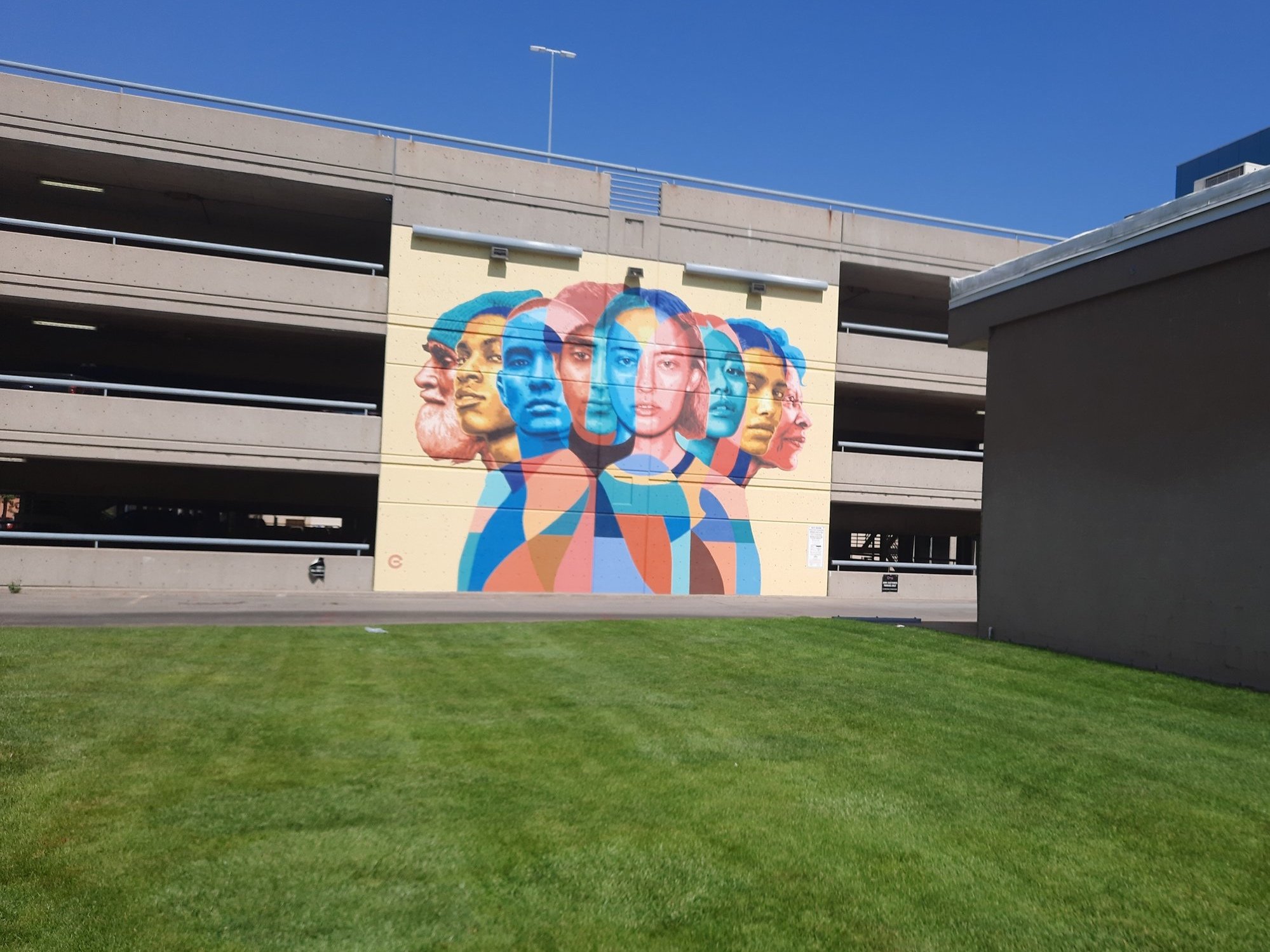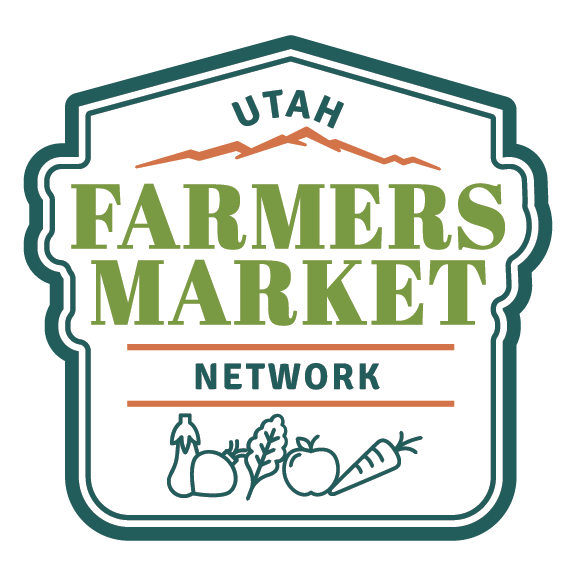
Diversity, Equity, and Inclusion
The Utah Farmers Market Network is committed to Diversity, Equity, and Inclusion (DEI). We encourage and support markets across the state in becoming more welcoming and inclusive to historically marginalized and excluded populations, especially Black, Indigenous, and People of Color (BIPOC) and LGBTQIA2S+ communities.
Farmers markets play a vital role in supporting communities by providing gathering spaces and fostering local agriculture and economic development. However, market demographics are predominantly white across staff, vendor, and customer populations, posing high barriers to entry for people of color. According to 2021 census data, diversity within the state of Utah is steadily increasing. It is projected that one in three Utahns will identify as nonwhite by 2060.
In their Diversity in Utah Databook, The Kem C. Gardener Policy Institute found that minorities in Utah have unfavorable health and wealth disparities compared to their white counterparts. Governor Cox’s office posits, “women, people of color, and LGBTQIA+ communities in Utah have unique historical, socio, cultural, and economic barriers preventing them from participating fully in our state” (One Utah Equity & Opportunity: Progress & Accomplishments).
Diversity, Equity, and Inclusion (DEI) Community of Practice (CoP)
The Utah Farmers Market Network, in conjunction with Utah State University, convened a Diversity, Equity, and Inclusion (DEI) Community of Practice (CoP) with 7 markets (market managers plus one additional support staff) across the state of Utah between June-November 2021. Over the course of 6 months, the CoP convened virtually 1-2 times per month for an orientation and 8 sessions, which ran 90 minutes each. During these sessions, they explored the basic concepts of DEI, collected data on the inclusivity of their markets and broader organizations, and created SMARTIE (strategic, measurable, attainable, realistic, time-bound, inclusive, and equitable) goals as part of their data-driven DEI strategic plans. Click on the DEI CoP Guide button below for detailed information on the CoP.
DEI CoP Resources
The following resources were developed for use in the DEI CoP by Jaclyn Pace, UFMN Diversity Assistant, and Regan Emmons, UFMN Coordinator, with input from a panel of researchers and professors at USU.
This guide outlines the goals, objectives, and session details of UFMN’s DEI CoP and can be used to guide future DEI initiatives.
This document provides an overview of the goals, evidence of need, strategy, and impacts of UFMN’s DEI CoP.
This Market Environment Scan was developed for use by CoP participants to collect baseline data which will provide a snapshot of the inclusivity and welcomeness of their markets, especially for those who have been historically oppressed and marginalized.
This Organizational Scan was developed for use by CoP participants to gather information about how they interface with staff, volunteers, vendors and the public through policies, outreach, communication, etc.
This scan was developed for use by CoP participants and was intended to paint a broad picture of the demographics in their specific communities and identify some of the resources available to those who reside there.
DEI Strategic Planning Workbook
This workbook was developed for use by CoP participants and is meant to serve as a guide for their organization’s DEI Strategic Plans, beginning with the personal and moving into the organizational and broader community contexts.
Inclusive Welcome Signage designed with input from DEI CoP participants to be displayed at participating markets beginning in the 2022 season.
External DEI Resource Bank
Food Systems Leadership Network Racial Equity Resource List
The FSLN is a national peer learning community that connects current and emerging leaders, strengthens individual and collective leadership capacity, and fosters collaboration across communities. The goal of the network is to accelerate the realization of a just, equitable, and sustainable food system that generates good food, health, and opportunity for all.
Farmers Market Coalition Anti-Racist Farmers Market Toolkit
The national Farmers Market Coalition is a 501(c)(3) nonprofit dedicated to working with farmers market operators to strengthen farmers markets across the United States so that they can serve as community assets while providing real income opportunities for farmers. The Anti-Racist Farmers Market Toolkit exists to help farmers market managers make progress toward becoming anti-racist managers of anti-racist markets.
Welcoming and Inclusive Farmers Markets: A Community of Practice to Encourage Diversity, Equity, and Inclusion (Outcomes & Impact Quarterly)
Farmers markets, as vibrant hubs for community connection and stimulus to the local economy, often have staff, vendor, and customer demographics that are predominantly white. The Utah Farmers Market Network (UFMN) convened a Diversity, Equity, and Inclusion Community of Practice with market managers statewide to assist markets in becoming more welcoming and inclusive of historically excluded populations.
Farms and gardens everywhere but not a bite to eat?
Authors Leah Joyner, Blanca Yagüe, Adrienne Cachelin, and Jeff Rose implement community-engaged research techniques to investigate how underlying socio-political, economic, and geographic factors—such as inequitable access to land, housing, food, and transportation—undergird food apartheid and complicate efforts toward equitable urban agriculture in SLC, despite the best intentions of urban farmers.
An Annotated Bibliography on Structural Racism Present in the U.S. Food System
This annotated bibliography from Michigan State University provides current research and outreach on structural racism in the U.S. food system for the food system practitioner, researcher, educator, and advocate.
How to Create a Welcoming Farmers Market for SNAP Shoppers
This free course developed by Texas Center for Local Food is intended to inform markets of best practices for creating a welcoming environment for SNAP shoppers.
Becoming An Anti-Racist And Multicultural Organization
This document provides a summary of The Wallace Center‘s journey thus far towards centering racial justice and equity in their organization in a meaningful, authentic, and accountable way as embodied in their racial equity commitments.
Webinar - Racial Equity in Food Systems Work: Beginning the Journey
In this webinar from Michigan State University’s Center for Regional Food Systems, Shorlette Ammons of North Carolina’s Center for Environmental Farming Systems introduces webinar participants to tools and language used in racial equity training. This webinar gives an introduction to greater conversations and work surrounding racial equity and food access.
Diversity in Utah Data Book: Race, Ethnicity, and Sex
This report by the Kem C. Gardner Policy Institute at The University of Utah provides data and information to help state and community leaders make progress in their equity, diversity, and inclusion efforts. The data and context provided in this report shed light on existing disparities; help people understand the complexities of these measures; and help provide a starting point for evaluating future progress.
Racial Equity Tools offers tools, research, tips, curricula, and ideas for people who want to increase their own understanding and to help those working for racial justice at every level – in systems, organizations, communities, and the culture at large.
Harvard Implicit Association Test
The mission of Project Implicit is to educate the public about bias and to provide a “virtual laboratory” for collecting data on the internet. Project Implicit scientists produce high-impact research that forms the basis of our scientific knowledge about bias and disparities. At this link you can take any number of Implicit Association Tests.
Right To Be, formerly Hollaback!, holds virtual trainings on harassment, de-escalation, bystander intervention, and more.
Research Brief - Identifying and Countering White Supremacy Culture in Food Systems
As a result of whiteness, white supremacy culture narratives function to reinforce systemic inequity across the food system in the United States. This paper from the Duke Sanford World Food Policy Center identifies eight messages from food insecurity policies and practice stemming from broader white supremacy culture and whiteness.
Timeline: Black farmers and the USDA, 1920 to present
This timeline from the Environmental Working Group documents and details the USDA’s history of discrimination against Black farmers.
This resource developed by Tema Okun outlines the concept of White Supremacy Culture and its characteristics as well as the Racial Equity Principles that can counteract it.
Photo description: Photo of Cole Eisenhour’s "You Belong" from the grounds of Farmers Market Ogden taken by Jaclyn Pace


